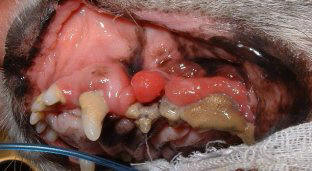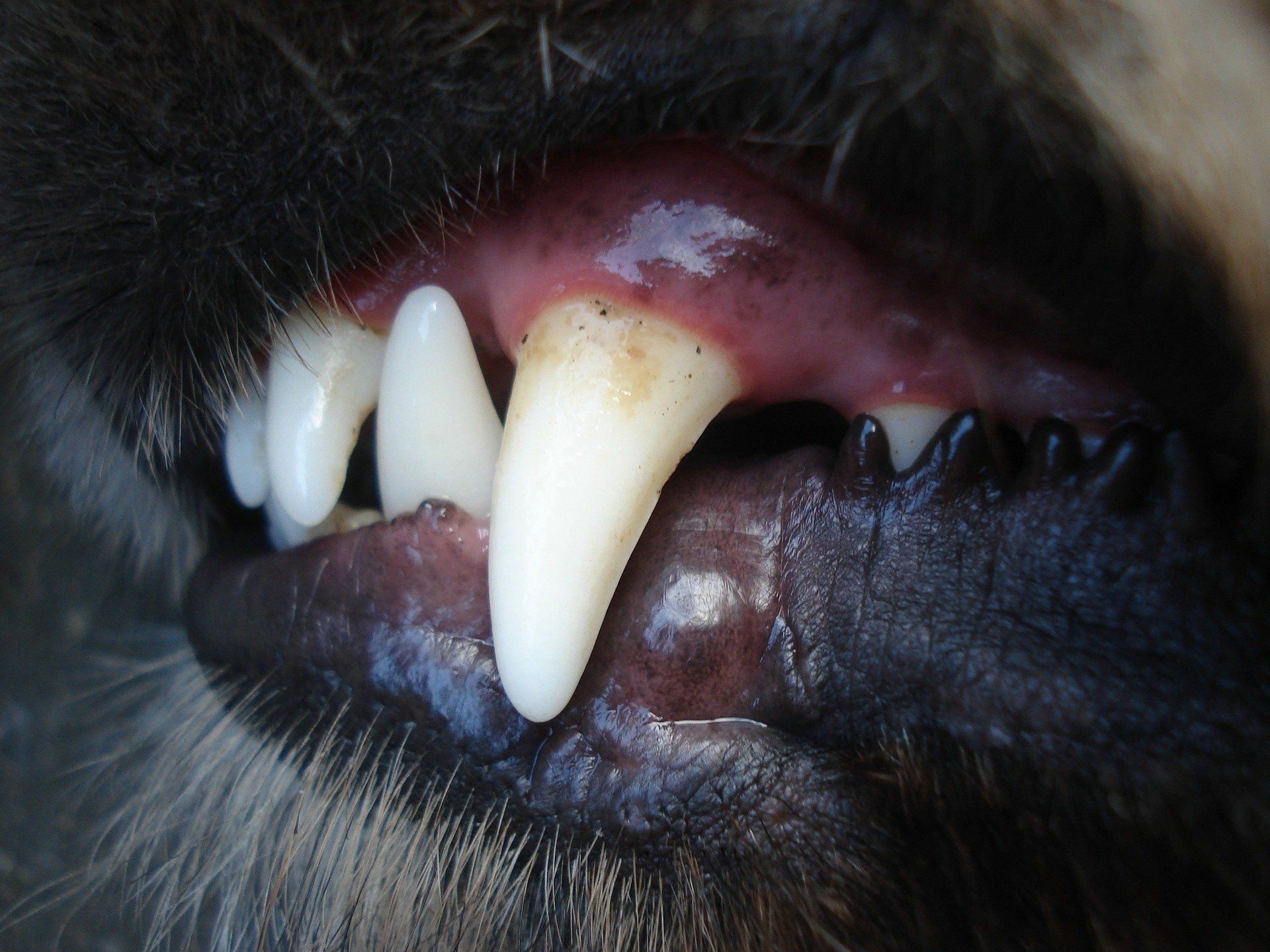DENTAL CARE
Dental Disease is one of the most common problems we see - yet often it is poorly managed.
Most animals or pets have teeth - most vets will vouch for this fact! Unlike humans, animals are usually not too good at looking after their own teeth and so we usually have to do this for them.
Why do I need to worry about dental care?
Dental problems will affect nearly all domestic animals at some point in their life to differing extents. This could range from just the inconvenience of bad breath to more serious problems such as gum disease or severe tooth ache. Dental disease can also cause problems not associated with the mouth - bacteria from serious dental disease can potentially enter the blood stream and this can cause kidney damage or even certain forms of heart disease. Even on a basic level - it can seriously affect the animal's enjoyment of life.
Why do I need to worry about dental care?
Dental problems will affect nearly all domestic animals at some point in their life to differing extents. This could range from just the inconvenience of bad breath to more serious problems such as gum disease or severe tooth ache. Dental disease can also cause problems not associated with the mouth - bacteria from serious dental disease can potentially enter the blood stream and this can cause kidney damage or even certain forms of heart disease. Even on a basic level - it can seriously affect the animal's enjoyment of life.

The picture on the above is what can happen if good dental care doesn’t take place. This dog has got gingivitis, periodontal disease, loose teeth, a tooth root abscess and a small oral tumour!
When do I start examining the mouth and teeth?
From an early age, you will need to get the animal accustomed to having his or her mouth examined (especially dogs). It will make your life easier as owners to examine and familiarise yourself with what is "normal" and will make our job as vets easier when it comes to peering into the snarling abyss! The more you examine the mouth, the less the animal will find the whole experience strange and it should get easier each time.
What should I look for in the mouth?
Again, this is why you should be familiar with what "normal" is like, as only if you can do this will you spot if something is wrong. When examining the mouth and teeth - always be careful and be aware that any animal can inflict a nasty bite if they set their mind to it.
Dogs: lift up the upper lips on the side of the mouth and look at the surface of the teeth - especially the canines and the carnassials, which are the big grinding teeth at the back of the mouth. You should look for excessive plaque build up, signs of sore or infected gums (redness, recession), signs of broken or chipped/fractured teeth and also look for any unusual lumps, bumps or swellings. Try to examine both sides as they can be very different!
Cats: are notoriously more difficult to examine the mouth. Often the best way to quickly check the teeth is when they are yawning! If you can, gently hold the head and push apart the lips at the side of the head. Doing this you should be able to see the canines and molars. Don't worry if you cannot get a good look - even us vets and nurses sometimes struggle!
Rabbits and other small mammals: without special instruments, it is only really possible to check the incisors (long front teeth). Rabbits don't tend to appreciate a dental exam unless they are used to it. Again, it is advisable to start getting them used to having their mouths looked at from an early age. By gently holding the head and lifting the lips up at the front of the mouth - it should be possible to see both the upper and lower incisors. They should be relatively short and not have too much of a curve to them in any directions.
What else should I look for?
Other than examining the mouth physically - there are lots of other things you can check too:
What can I do to prevent dental disease?
With many other conditions, prevention is better than cure, and this certainly applies to dental disease too. Often it is not possible to completely avoid dental problems but certain steps can be taken to limit these problems and reduce the need for dental procedures.
What do I do if I am worried?
If you are concerned about any aspect of the mouth or teeth, you should seek veterinary attention. The nurses will be happy to discuss dental care with you and are able to help you examine the mouth and help decide if the animal should see a vet.
What can be done to help if my animal has a dental problem?
If there is a problem with the teeth, we can help! Our dental services range from a scale and polish (which removes all the plaque from the teeth and then polishes up the surface so it is nice and clean and white again) to more serious dental work (such as tooth extractions or investigations into tooth root abscesses). It has to be appreciated that no animal will lie back and say "aaagh" when we want to examine the mouth in depth or perform any work with the mouth, and so for this reason we nearly always have to give the animal a general anaesthetic. It is again worth mentioning that prevention is better than cure - it is better to do a simple scale and polish, that to wait until the plaque has caused serious tooth decay and gum infections.
What about other animals’ teeth?
We also see problems very commonly in other animals. Rabbits are very prone to real problems with teeth. Whilst overgrown incisors can usually be treated quickly and without the need for a general anaesthetic, they often suffer from molar problems. Because the design of rabbits mouths, it is very difficult to even see the molars without a general anaesthetic, and so rabbit dentistry can be quite challenging.
When do I start examining the mouth and teeth?
From an early age, you will need to get the animal accustomed to having his or her mouth examined (especially dogs). It will make your life easier as owners to examine and familiarise yourself with what is "normal" and will make our job as vets easier when it comes to peering into the snarling abyss! The more you examine the mouth, the less the animal will find the whole experience strange and it should get easier each time.
What should I look for in the mouth?
Again, this is why you should be familiar with what "normal" is like, as only if you can do this will you spot if something is wrong. When examining the mouth and teeth - always be careful and be aware that any animal can inflict a nasty bite if they set their mind to it.
Dogs: lift up the upper lips on the side of the mouth and look at the surface of the teeth - especially the canines and the carnassials, which are the big grinding teeth at the back of the mouth. You should look for excessive plaque build up, signs of sore or infected gums (redness, recession), signs of broken or chipped/fractured teeth and also look for any unusual lumps, bumps or swellings. Try to examine both sides as they can be very different!
Cats: are notoriously more difficult to examine the mouth. Often the best way to quickly check the teeth is when they are yawning! If you can, gently hold the head and push apart the lips at the side of the head. Doing this you should be able to see the canines and molars. Don't worry if you cannot get a good look - even us vets and nurses sometimes struggle!
Rabbits and other small mammals: without special instruments, it is only really possible to check the incisors (long front teeth). Rabbits don't tend to appreciate a dental exam unless they are used to it. Again, it is advisable to start getting them used to having their mouths looked at from an early age. By gently holding the head and lifting the lips up at the front of the mouth - it should be possible to see both the upper and lower incisors. They should be relatively short and not have too much of a curve to them in any directions.
What else should I look for?
Other than examining the mouth physically - there are lots of other things you can check too:
- What is the appetite like. If they are not eating do they look hungry? Are they looking interested in the food but just aren't able to eat it properly.
- What is the breath like? Usually bad breath is caused by problems in the mouth - either teeth or gums.
- Is the animal selecting one type of food - often animals with a sore mouth will only eat soft food or liquids. Quite a common finding is pets that will lick the gravy and leave the rest of the food.
- Is the animal favouring one side of its mouth? Is food falling out of the mouth?
- Is there any excessive salivation? Rabbits especially tend to dribble or drool if they have a sore mouth.
- Has there been any weight loss recently? Again this is more of a problem in rabbits and small mammals as it is harder to tell how much they are eating.
What can I do to prevent dental disease?
With many other conditions, prevention is better than cure, and this certainly applies to dental disease too. Often it is not possible to completely avoid dental problems but certain steps can be taken to limit these problems and reduce the need for dental procedures.
- Check teeth and mouth regularly - many problems if caught early will not be serious, but may progress to be more of a problem if not noticed or ignored.
- Feed the correct diet - avoid inappropriate foodstuffs and diets. Chocolate treats should be avoided!
- Ensure enough hard objects are given to chew on. Special chews, or bones are readily available that all will help keep the teeth in good shape. Although this applies mainly to dogs - it is a good idea for cats to have some form of crunchy biscuits in their diet as this helps. Rabbits should always have access to good quality hay or grass as this plays a very important role in keep the incisors growing correctly.
- Use animal toothpaste. Human teeth care involves physically brushing the teeth. Whilst some animals will let you do this - most won't and it can be very frustrating for both parties! Animal toothpaste works by enzymes and so doesn't really require physical brushing. The toothpaste usually comes as a gel or paste that you rub onto the teeth daily and this help reduced the build up a large amounts of plaque.
- Cleaning the teeth with special pet toothbrushes can really help. With dogs a good trick is to use a piece of fabric elastoplast wrapped around your finger as a brush as this really makes life easier!
What do I do if I am worried?
If you are concerned about any aspect of the mouth or teeth, you should seek veterinary attention. The nurses will be happy to discuss dental care with you and are able to help you examine the mouth and help decide if the animal should see a vet.
If there is a problem with the teeth, we can help! Our dental services range from a scale and polish (which removes all the plaque from the teeth and then polishes up the surface so it is nice and clean and white again) to more serious dental work (such as tooth extractions or investigations into tooth root abscesses). It has to be appreciated that no animal will lie back and say "aaagh" when we want to examine the mouth in depth or perform any work with the mouth, and so for this reason we nearly always have to give the animal a general anaesthetic. It is again worth mentioning that prevention is better than cure - it is better to do a simple scale and polish, that to wait until the plaque has caused serious tooth decay and gum infections.
We also see problems very commonly in other animals. Rabbits are very prone to real problems with teeth. Whilst overgrown incisors can usually be treated quickly and without the need for a general anaesthetic, they often suffer from molar problems. Because the design of rabbits mouths, it is very difficult to even see the molars without a general anaesthetic, and so rabbit dentistry can be quite challenging.


